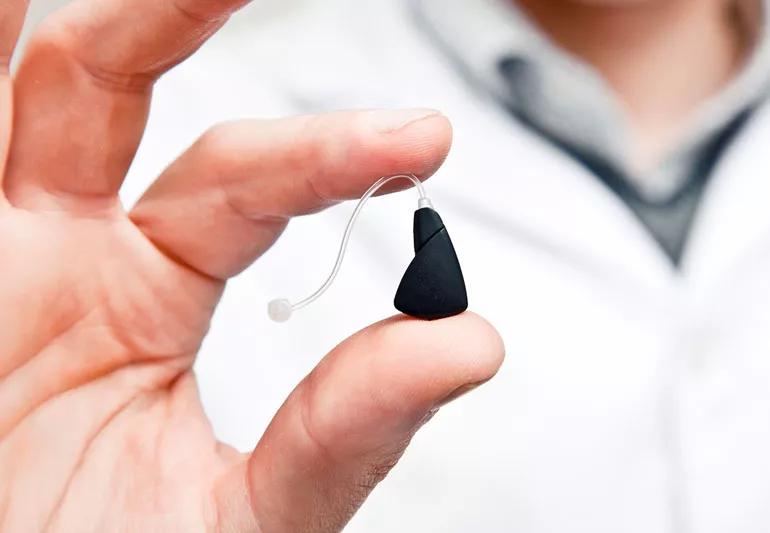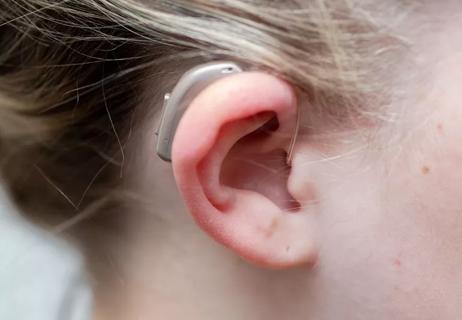Advertisement
Four steps to getting the perfect hearing aids for your lifestyle

“Can you repeat that?”
Advertisement
Cleveland Clinic is a non-profit academic medical center. Advertising on our site helps support our mission. We do not endorse non-Cleveland Clinic products or services. Policy
“I’m sorry, what did you say?”
“What was that last thing you said?”
“Say that again, please?”
Feeling like you can’t understand what others are saying or not as clearly as you once could can be incredibly frustrating. If you find yourself frequently asking these questions, you may have some loss of your hearing. If you think you could have some hearing loss, it’s important not to ignore the signs, which can include ringing in your ears and trouble understanding what is being said.
Here are the steps to follow if you suspect hearing loss, according to audiologist Sharon Sandridge, PhD.
If you suspect a problem with your hearing, visiting an audiologist is your first step.
During your exam, be prepared to tell the audiologist if you hear ringing in your ears, if you have any balance issues or if you have trouble hearing conversations, especially when there is noise in the background or others talking. Your audiologist will then evaluate your hearing, explain any problems they find and discuss next steps. If a medical problem is a possibility, the audiologist will refer you to see an ear, nose and throat (ENT) doctor to investigate the medical cause of your hearing and/or balance issues.
Advertisement
The audiologist will conduct a comprehensive evaluation of your ability to hear. The impact of a hearing loss on your daily quality of life will also be assessed and your audiologist will ask you questions to see to what extent the hearing loss is impacting your personal circumstances and lifestyle.
If a hearing or balance problem is detected, the audiologist will make recommendations for a follow-up which may include returning for a hearing needs assessment, testing for balance issues or to see a ENT to investigate further the cause for your hearing or balance issues.
“During this consultation, the audiologist will discuss the various types of hearing devices available,” says Dr. Sandridge. “Together we will decide which hearing aids or other devices are most appropriate for your lifestyle, communication needs and budget.”
There are many hearing aid options, but hearing aids aren’t always the most appropriate option for everyone. Depending on the severity or type of hearing loss, there are other options to correct hearing loss.
If hearing aids are recommended, your audiologist will make sure they fit properly in your ears and are programmed to your listening needs. A comprehensive treatment plan will also help you learn how to care for your hearing aids and how to use them along with other communication strategies to get the highest satisfaction.
Hearing aids come in different styles and offer a wide range of options. While there are four basic styles of hearing aids, the majority of devices are devices that fit behind your ear with a small wire with a receiver at the end of it that fits in the ear canal. This is the most cosmetically appealing and fits the majority of those needing hearing aids.
Hearing aids come in a variety of colors or you can get rechargeable devices or ones that use batteries. You can also get hearing aids that offer different levels of technology from basic to more advanced.
Better microchip technology has improved the signal processing capabilities of hearing aids in recent years, enhancing the sound quality and ability of the hearing aid to adapt to the various listening environments. Now, all hearing aids connect directly with smart phones for easier phone conversations. Plus, most phones can act as a remote control for the devices.
“The microchips in the hearing aids will continue to have faster processing speed,” says Dr. Sandridge. “They’ll become better at extracting speech from background noise than ever before. This will allow you to better tune in the conversations you want to hear, but at the same time reduce background noise as much as possible.”
Not only that, but ongoing research is always working to improve sound transmission and reduce noise interference and feedback.
The correct hearing aids can change your life for the better. Once you address hearing issues with the appropriate hearing aids, you can feel more connected to life and to others.
Advertisement
Learn more about our editorial process.
Advertisement

Reduce background noise, don’t talk too fast or too slow and above all, ask what’s most helpful to them

Care for your ears by steering clear of cotton swabs, taking precautions in loud settings and seeking medical help when needed

There are lots of tips, tricks and assistive devices out there that can help

Seeing a licensed professional is still key to treating hearing loss

Hearing aid technology has vastly improved over the last several years

Keeping your brain healthy is key

Noise-induced hearing loss is 100% preventable

Make it easier to hear and be heard

Focus on your body’s metabolic set point by eating healthy foods, making exercise a part of your routine and reducing stress

PFAS chemicals may make life easier — but they aren’t always so easy on the human body

While there’s little risk in trying this hair care treatment, there isn’t much science to back up the claims